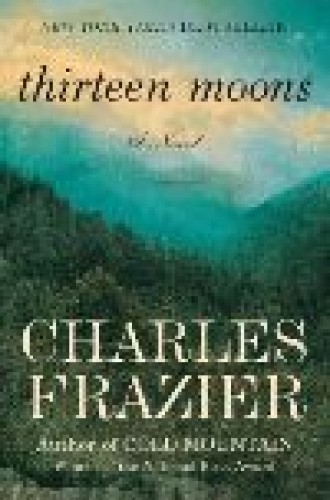Thirteen Moons
Charles Frazier had a tough act to follow. His first novel, Cold Mountain, was both a literary and a popular sensation. It has sold more than 4 million copies, inspired a major Hollywood film, and won the National Book Award.
During his research for that 1997 novel, Frazier came across a reference to a 90-year-old white man who spoke nothing but Cherokee during the final weeks of his life. This snapshot of a life captured Frazier’s imagination and led him to write Thirteen Moons, a portrait of Will Cooper—indentured orphan, frontier lawyer and “White Chief” of the Cherokee of western North Carolina.
Despite many similarities to the earlier book, Thirteen Moons is considerably bleaker than its predecessor. The story of Will Cooper is an elegy of loss imbued with the tragic awareness that everything we cherish ultimately slips through our fingers.
Yeats wrote, “Man is in love and loves what vanishes / What more is there to say?” Thirteen Moons (its title is Cherokee vernacular for the many seasons of life) is a 425-page reflection on this theme. Modeled after the heroic tales of King Arthur’s knights that Will reads as a boy, Thirteen Moons displays what most hero stories keep hidden—the long, slow unraveling of a life. After young Will rises to the heights of vitality, all that is left to watch is the waning.
At the age of 12, Will is sold into indentured servitude to an “ancient man” who places him in charge of a dilapidated trading post on the outskirts of Cherokee territory. With remarkable ingenuity, Will makes the most of his precarious start in life. He becomes a lawyer, a state senator, even a chief among a Cherokee clan whose members adopt him as their own. Most significantly he becomes the lover of Claire—a soul mate who remains as elusive as forbidden fruit. When Will loses Claire, the center of his life no longer holds. His fortune, his influence and his sense of self begin a slow erosion that renders him a solitary old man with nothing more to do than sit on the porch with his shotgun and take potshots at passing trains.
This is where we meet Will—at the age of 90, pining for death and contemplating how his life has intertwined with that of his adopted community. During his lifetime, the Cherokee’s sovereignty, land and cultural identity were stripped away by the atrocious events leading up to the Trail of Tears. As Frazier’s novel unfolds, Will looks back on all of this: “the days and nights, the thirteen moons” of each accumulated year and every registered loss. “Everyone and everything you love goes away,” Will laments. “You’re left with nothing but your moods and your memory. Pitiful and powerful tools.”
Will’s recollections are as tender as they are sad. He recalls lush green savannahs and deep blue ridges; a people in harmony with each other and their world; a couple innocent in first love. The Carolina highlands of his memories appear as a lost Eden: a magical place and time before the trains arrived, before the Cherokee were “clean[ed] out the mountains cove by cove,” before two lovers went separate ways. If the first half of Thirteen Moons feels a bit too dreamy, it is because it depicts Will’s memory of a time before the Fall. If the second half seems too bleak, it is because that Eden—like the original—was merely a temporary home.
Unlike Cold Mountain, Thirteen Moons will probably never be called a great American novel. Frazier’s writing in this instance too closely resembles a circuitous mountain trail. Neither will the book become a popular sensation. The mood is much too dark. Yet it still deserves admiration. Through the haunting story of a clay-footed hero, Frazier unflinchingly portrays the transitory nature of the human condition and the potential loss that lies dormant in every occurrence of love. Through one remarkable life, he charts the rise and fall of us all.





